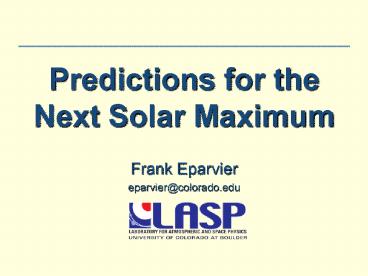Predictions for the Next Solar Maximum - PowerPoint PPT Presentation
1 / 13
Title:
Predictions for the Next Solar Maximum
Description:
There is a longer record of SSN than any other directly measured ... O.C. St. Cyr (ex officio) NASA GSFC. Ask 12 Scientists: Empirical Methods. Precursor (22) ... – PowerPoint PPT presentation
Number of Views:26
Avg rating:3.0/5.0
Title: Predictions for the Next Solar Maximum
1
Predictions for the Next Solar Maximum
- Frank Eparvier
- eparvier_at_colorado.edu
2
- If youre not confused, youre not learning.
D. Bell, circa 1981 Neil Armstrong High
School Neenah, Wisconsin
3
The Solar Sunspot Cycle Record
- There is a longer record of SSN than any other
directly measured solar property (because theyre
relatively easy to see count) - Sunspots counted since 1610
- Solar Sunspot Cycles numbered with first starting
in 1755
- SSN is well correlated with other space weather
phenomena - Solar irradiances in general
- Rate and energy of solar flares
- Rate of CMEs
- Cosmic Rays (anti-correlation)
- Geomagnetic Activity (shifted forward by 3 yrs
to declining phase of cycle)
4
Other Solar Cycle Indices
- Solar 10.7 cm radio irradiance (F10.7 index)
- Measured from ground since 1947
- Good correlations with ultraviolet irradiances
- Space-based Indices
- Better correlations with irradiances that drive
space weather - Only measured in recent decades (mostly since the
late 1970s) - eg. HI Ly-a (121.6 nm), Mg II C/W ratio, TSI
5
Solar Cycle 24 Predictions Panel
- International group formed to generate the
official prediction for NOAA, NASA, and the
International Space Environment Services (ISES) - This is only the 3rd solar cycle with such a
prediction panel formed - SC24 Panel has 12 voting members (with additional
consultants) - Charged with predicting for SC24
- Timing of maximum and minimum
- Strength of cycle in 10.7 cm radio flux (F10.7)
and Sunspot Number (SSN) - SC24 Panel Timeline
- October 2006 First Meeting
- March 2007 Consensus Statement
- June 2008 Prediction (non)Update
- May 2009 Prediction Update
6
Ask 12 Scientists
- Empirical Methods
- Precursor (22)
- Climatology (13)
- Recent Climatology (2)
- Neural Network (2)
- Spectral (12)
7
2007 Panel Prediction A Split Decision
Unable to reach a single consensus, the panel
released two predictions.
- Solar Min
- Mar 2008 (6 mo)
- Low SC24 Peak
- SSN 90 (10)
- Aug 2012
- High SC24 Peak
- SSN 140 (20)
- Oct 2011
- Note The mean of cycles 1-23 predicts SSN
11540 on Apr 2011.
8
SC24 as Prediction Discriminator
- Methods of prediction
- Cycle averages (recent or long term)
- Trends or periodicities in cycle sizes (even-odd)
- Statistical analysis (regression techniques)
- Precursors using information from other cycle
indicators besides sunspots or irradiances - Dynamo models constrained by data
- The actual behavior of SC24 should help determine
the validity of the many empirical prediction
techniques and may discriminate between dynamo
models.
9
Dynamo Model Predictions (1)
- Dikpati, deToma, and Gilman (GRL, 33, 2006)
- Flux transport dynamo models magnetic flux
conveyor belt equator to pole at surface then
pole to equator inside Sun - Uses sunspot area and position data as
constraints - Previous cycles information is remembered
inside Sun and influences current cycle - 2006 Prediction for SC24
- Larger than average
- SSN 180 15
- 2009 Update stand by prediction of large cycle
Dikpati, et al., 2006.
10
Dynamo Model Predictions (2)
- Choudhuri, Chatterjee, and Jiang, (Phys. Rev.
Lett, 98, 2007) - Another flux transport dynamo model
- Uses solar polar magnetic field measurements as
constraints - Treats diffusion differently than Dikpati, et al.
- 2007 Prediction for SC24
- Smaller than average
- SSN 75
Choudhuri, et al., 2007
11
Precursor Predictions
- Precursor methods can be more than just
numerology as they use indicators that are
related to the physical processes that dynamo
models try to capture. - Geomagnetic Indices
- Influenced by solar activity so an indirect
measure of solar magnetic activity - Solar Polar Magnetic Fields
- Direct measure of magnetic flux transport
- Combined techniques
- Precursor predictions initially spanned the board
- Predictions made after solar minimum arrived
became consistent - SC24 will be small and late
12
How is SC24 Unfolding?
- By 2009 it was clear that minimum hadnt been
reached in March 2008. - It was also uncertain whether the rising phase of
SC24 had even started.
13
What have we learned?
- The current minimum has been long, so expect the
next maximum to be later than initially
predicted. - Precursor techniques using polar fields and
geomagnetic indices seem to be reliable, but only
if you wait until true solar minimum. They
predict a small SC24. - Flux Transport Dynamo Models give us hope we may
someday understand the Sun well enough to predict
it using physics, but were probably not quite
there yet.
Bottom line The Sun will do what the Sun will do.































